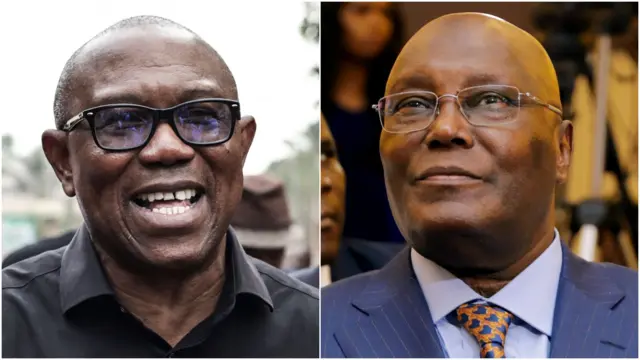Political Realignment in Nigeria Ahead of 2027 Elections
Nigeria’s political landscape is experiencing a significant transformation, with prominent opposition leaders Atiku Abubakar and Peter Obi uniting under the African Democratic Congress (ADC). This strategic alliance comes as both politicians have distanced themselves from their former parties—the Peoples Democratic Party (PDP) and the Labour Party (LP)—in a bid to present a united challenge to the current President Bola Tinubu and his All Progressives Congress (APC).
Reasons for the Coalition
The convergence of Abubakar and Obi follows a series of negotiations aimed at pooling their electorates for the upcoming 2027 elections. In the previous election, President Tinubu secured victory with only 37% of the votes, while Abubakar and Obi garnered 29% and 25%, respectively. This partitioned vote among opposition supporters ultimately weakened their chances.
During the formal announcement of their alliance, ADC’s interim chairman David Mark emphasized the objective of this coalition was “to protect Nigeria’s democracy and safeguard against a one-party system.” Both the PDP and LP face their own internal challenges, which some analysts believe could have been exacerbated by outside influences.
Political Heavyweights Joining Forces
The ADC now boasts prominent figures such as former Senate President David Mark and ex-PDP chairman Uche Secondus, in addition to former allies of Tinubu like Nasir El-Rufai and Rotimi Amaechi. Political analysts suggest that Abubakar, 78, is likely to clinch the presidential nomination for a fifth time, positioning Obi, 63, as a potential running mate.
Understanding the ADC
While the ADC has been an existing party since its inception in 2005, recent developments have increased its visibility on the national stage. The party has undergone name changes but currently holds a reasonable number of seats in the legislative chamber.
Jamilu Danladi of the ADC expressed doubts about the feasibility of establishing a brand-new party quickly, leading to the decision to align with the ADC. Despite not being one of Nigeria’s major political forces, the ADC’s infrastructure and national reach offer a solid base, bolstered by the influential politicians joining its ranks.
Concerns Over Candidate Roles
The question looms whether Abubakar and Obi can work effectively together after their previous collaboration in 2019 ended in defeat against the APC’s Muhammadu Buhari. Obi, having previously left the PDP for the LP due to aspirations for leadership, has indicated he is not interested in a subordinate role. In recent interviews, he has confirmed his intention to pursue the presidency independently.
2027 Election Prospects
Political observers remain divided on the coalition’s prospects in the elections. Some analysts believe that the collaboration significantly improves their chances against Tinubu. Ben Kenneth noted, “If they had worked together last time, their combined votes would have secured a victory, so it’s promising that they’ve recognized this need.” Conversely, others like Sani Hamisu argue that incumbents rarely lose an election when seeking a second term.
Implications for the PDP and Labor Party
In light of this coalition, the PDP has ruled out any potential partnership with the ADC and chooses to engage the APC independently. The loss of Obi, who substantially elevated the profile of the Labour Party, could hinder its competitiveness moving forward. Analysts believe that the ADC could soon surpass the PDP as the leading opposition party as it attracts more influential members.
| Politician | Former Party | Current Role |
|---|---|---|
| Atiku Abubakar | Peoples Democratic Party (PDP) | Presidential Candidate |
| Peter Obi | Labour Party (LP) | Vice Presidential Candidate |
| David Mark | Peoples Democratic Party (PDP) | Interim Chairman of ADC |
| Uche Secondus | Peoples Democratic Party (PDP) | ADC Member |
As Nigeria heads towards the 2027 elections, the impact of this new coalition will undoubtedly influence the political dynamics in the country, challenging the current ruling party’s dominance.


